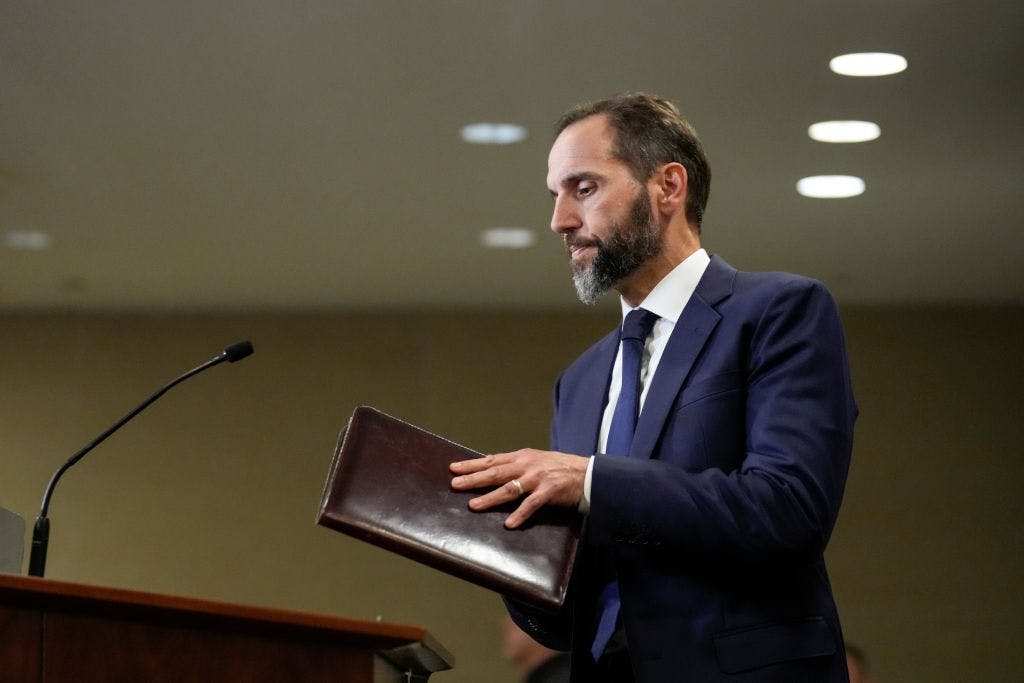Jack Smith, in Aggressive Finale, Pushes for ‘Emergency’ Release of His Report on Trump’s Prosecutions
The special counsel asks an appellate court to overrule Judge Cannon — one last time.

The filing by Special Counsel Jack Smith to the 11th United States Appeals Circuit of an emergency motion for summary reversal of Judge Aileen Cannon’s order blocking the release of his final report is an aggressive finale to years of frustrated prosecutions.
This request could be the denouement in the series of clashes that have come to define Mr. Smith’s legal relationship with Judge Cannon, who has consistently frustrated his goal of taking Trump to trial for the storage of classified documents at his Palm Beach seat. Mr. Smith plans to take his leave before Trump is inaugurated.
Mr. Smith here challenges Judge Cannon’s order “barring dissemination of the Final Report that Special Counsel Smith recently submitted to the Attorney General pursuant to Justice Department regulations.” The 11th United States Appeals Circuit, though, has already held that the report can be released once Judge Cannon’s injunction expires on Sunday — if it is not extended.
That injunction, though, bars the release of not only the portion of Mr. Smith’s report that covers the classified documents case, but also the volume that summarizes his election interference case against Trump. Attorney General Garland intends to release that volume to the public, since the charges against Trump, the sole defendant, have been dismissed on account of immunity.
Even if the circuit riders lift Judge Cannon’s injunction, though, Mr. Garland does not intend to disseminate the report on the classified documents case far and wide. That is because the prosecution is ongoing — at least until January 20 — against two of Trump’s co-defendants and employees, Waltine Nauta and Carlose De Oliveira. Judge Cannon dismissed the charges against all three after finding that Mr. Smith was improperly appointed, but Mr. Smith appealed that ruling as it pertained to Messrs. Nauta and De Oliveira. Trump can pardon them once he takes office.
Now Messrs. De Oliveira and Nauta want Judge Cannon’s order indefinitely extended. They also seek further argument on whether the release of a final report is warranted. Mr. Smith contends that the circuit riders “should summarily reverse the district court’s temporary injunction, which is unnecessary and contrary to law.”
The special counsel regulations mandate that the attorney general “may determine that public release of these reports would be in the public interest, to the extent that release would comply with … legal restrictions.” Mr. Smith reckons with respect to the January 6 case that Judge Cannon “had no authority to enjoin the release of a report about a different case against a different defendant that was bought (and since dismissed) in a different court.”
Mr. Smith explains that “the Department of Justice, if permitted, intends to make” the volume on the secret documents found at Mar-a-Lago “available to certain members of Congress on a limited basis — the “Chairmen and Ranking Members of the House and Senate Judiciary Committees for review in camera upon their request and agreement prohibiting any public release.”
The defendants in the Mar-a-Lago case argue that Judge Cannon’s ruling that Mr. Smith was unlawfully appointed means that his report is invalid. The Special Counsel, though, insists that “those arguments are irrelevant at this stage in light of the Special Counsel’s transmission of the Final Report to the Attorney General. All that is left is for the Attorney General to determine how to handle that report, and his authority in this respect is clear.”
Mr. Smith argues that even if a court affirms Judge Cannon’s stunning determination that Mr. Garland blundered in his appointment, “the Supreme Court has recognized that investigative reports can be prepared by individuals who have not been appointed as officers of the United States.”
The special counsel argues that the ability of a subordinate prosecutor to release a report “is inherent in the office of Attorney General” and that “does not depend on the lawfulness of the Special Counsel’s appointment.” Mr. Smith even argues that Mr. Garland, who has reportedly drawn President Biden’s ire, “would have the authority to decide whether to publicly release a report prepared and provided to the Department by wholly private citizens.”
The 11th Circuit has reversed Judge Cannon before — at an earlier stage of the case, when she appointed a special master to oversee the government’s collection of evidence at Mar-a-Lago. The circuit riders called that a “radical reordering of our caselaw” that would “violate bedrock separation-of-powers limitations.”

